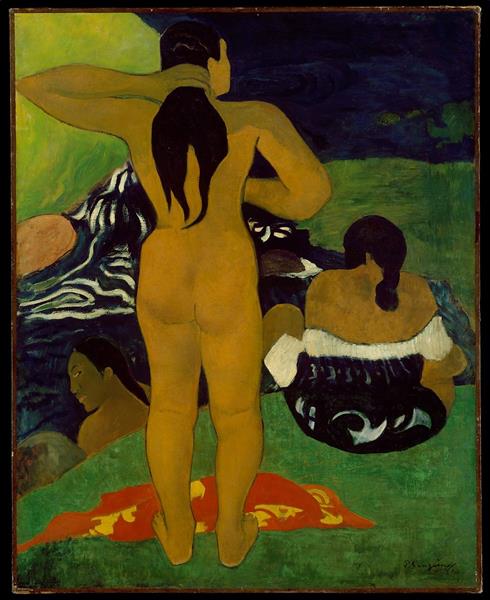Description
Paul Gauguin's Tahitian Women Bathing, created in 1892, stands as a landmark within the Post-Impressionist movement and embodies the artist's fascination with Tahitian life and culture, a recurring theme in his work after his move to the island. This painting presents a rich examination of the perception of Tahitian women, as well as a study of the interplay between color and form, hallmarks of Gauguin's style.
The composition of the work reveals an intimate return to the elemental, where two female figures submerge themselves in the gentle waters of a lush natural setting. The women, presented in various postures, suggest a deep connection with their surroundings, celebrating the visceral relationship between man and nature. The women’s bodies are rendered in a series of sensual contours, rendered from a palette of vibrant colors that invoke not only the dark skin of the Tahitian women, but also the green and blue hues of the landscape around them. This bold use of color is typical of Gauguin, who sought to express feeling and emotion through pigmentation, a notable contrast to the more realist practices of his contemporaries.
The figures' faces, though stylized and somewhat schematic, communicate a quiet wisdom; they are depictions of an introspective character, reinforcing the idea that these women are part of a larger, natural world. Gauguin, in his characteristic style, uses fluid line to define contours, creating a sense of movement in the stillness of the scene. The simplicity in the detail of the women's features reinforces the idea that their beauty lies in the purity and rhythm of Tahitian daily life rather than in superficial idealization.
The background of the painting, with its saturated vegetation and remote views, contrasts with the stillness of the figures in the foreground. Gauguin engages in a rather remarkable use of overlapping planes of colour, inviting the viewer to not only observe, but to feel the atmosphere of the island. The trees and leaves appear in almost iridescent hues, contributing to the almost dreamlike quality of the work. This dreamlike dimension is an essential component of Post-Impressionism, where representation is often a means of exploring the subjective and emotional, far from the mere visual record.
From a historical perspective, “Tahitian Women Bathing” exemplifies Gauguin’s interest in symbolism and his desire to move away from conventional European art; his move toward savoring Polynesian culture has been the subject of debate and analysis, especially in the context of coloniality and exoticism. His depictions of Tahitian women have been equally acclaimed and criticized, giving the work a resonance that goes beyond its pleasurable aesthetic. This painting speaks not only to visual beauty, but also to an intricate intersection between art and cultural narrative, inviting a glimpse into the complexity of identity in the age of colonial expansion.
In conclusion, “Tahitian Women Bathing” is not simply a depiction of Tahitian life; it is a visual account of Gauguin’s quest to understand and reinterpret what he observes through his particular artistic lens. Through his use of color and form, he captures not only a moment in the lives of these women, but also an essence of freedom and beauty that, in his gaze, repels the rigid categories of Western art of his time. This work remains a fascinating exploration of the connection between art, nature, and cultural identity, absorbing the viewer in its evocative effect.
KUADROS ©, a famous painting on your wall.
Hand-made oil painting reproductions, with the quality of professional artists and the distinctive seal of KUADROS ©.
Painting reproduction service with satisfaction guarantee. If you are not completely satisfied with the replica of your painting, we will refund 100% of your money.

